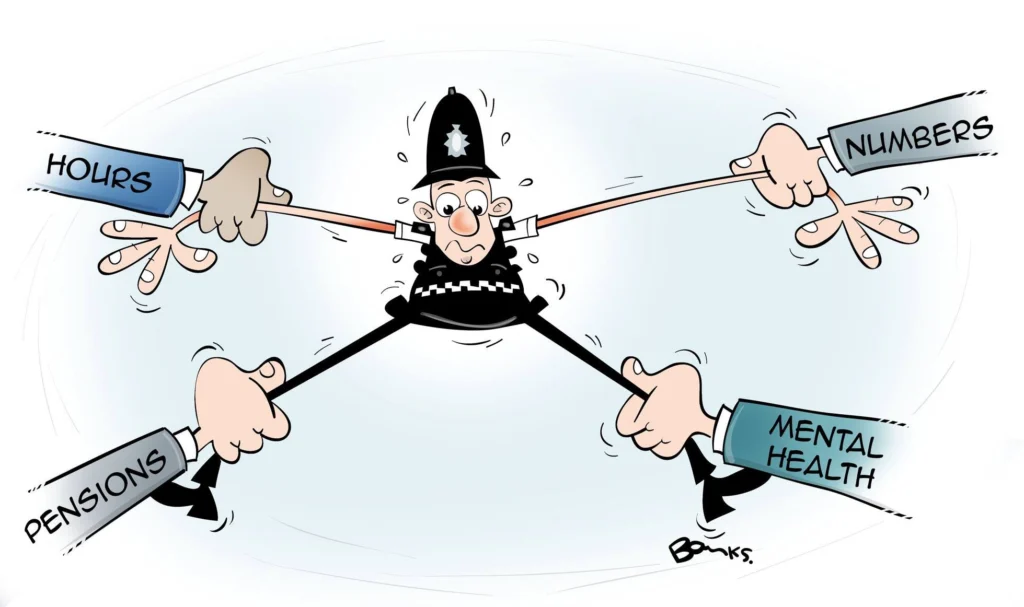Analysis
Saturday duty: A new UK government but the protests continue

Chris Hobbs attends the first demonstrations since the General Election involving pro-Palestinian protestors and a small number of pro-Israel counter-protesters.
The first post-General Election protest took place on Saturday and, for long suffering Metropolitan police officers and their colleagues from the City, it followed an all too familiar pattern.
Many officers were hoping against hope that they might be dismissed in time for the England match or at least be in their carriers watching the match on their mobile phones and tablets.
The day began in familiar surroundings with Russell Square again being the rendezvous point for the Pro-Palestinian protesters on a dull morning punctuated by sharp showers.
The difference on this occasion was that the march was to end on the Embankment within yards of Westminster Bridge. The conditions imposed were explicit and the intention was to keep protests away from Whitehall in anticipation of more post-election activity following the frenetic events seen the previous day.
In fact, the decision by the UK’s new Prime Minister to head for Scotland meant that Whitehall saw a typical day’s tourist activity until around 3.30PM.
As the march set off, many journalists and observers made their way to the area by St. Clement Dane’s Church which was the designated area for the pro-Israeli counter-protest.
On arrival, all the above were surprised to find that the ‘Enough is Enough’ organisation had called off their planned counter-protest.

A small counter-protest
It looked as if officers would have a trouble-free day as the pro-Palestinian protesters streamed past however a small number of Pro-Israeli protesters were not to be denied and congregated on Waterloo Bridge. They were confronted by a group of Palestinian protesters with police smartly intervening.
The small pro-Israeli group then made their way to a nearby section of the Embankment where they displayed their flags and banners.
A handful of these counter-protesters clutching a large ‘against terrorism,’ banner, tried to infiltrate the march; this is a tactic seen on previous marches and seems designed to attract any violent elements present.
March stewards quickly intervened and attempted to push these individuals and their banner back. This incident was interpreted on far-right social media as a ‘mob,’ attacking their rivals.
Fortunately, police were quicky ‘on scene,’ and City police officers formed a cordon in front of the pro-Israeli group. There then followed the familiar exchange of insults as the march passed by.
Estimation of numbers proved difficult as the march was stretched out with groups of several hundred congregating together. As previously, a number of protesters headed for home having reached their destination whilst the majority remained listening to the speeches including one by Jeremy Corbyn.

Protest conditions ignored
At 3.30 PM, I began to make my way home with the intention of going to my local pub to watch the England match; suddenly the TSG carriers which had been parked just behind the stage, moved off on ‘blues and twos.’ Within minutes the air was filled with the sound of police sirens and more police carriers could be seen heading towards Whitehall.
On walking towards Downing Street, the reason for the urgency became clear. A crowd of pro-Palestinian protesters had left the rally and were now blocking the road by Downing Street with some sitting down. More officers arrived and several could be seen moving amongst the crowd warning them that they were liable to arrest.
Officers then formed into a line and walking towards the crowd, moved them back across the road in a slow but controlled operation. In an unrelated incident nearby, a male had fallen over and suffered a head-injury. He was assisted by several officers rendering first aid.
By 4 PM the road was open and as the crowd were walking back towards Parliament Square, I began my delayed return journey.
Thanks to a taxi parked opposite Ealing Broadway station, I entered my local pub £15 poorer just as the match kicked-off!

Chris Hobbs is a former Special Branch officer who follows public order events for Police Oracle as an observer.
Tags: protest
Advertisement
Job of the week
Scenes of Crime Officer

- Cayman Islands Government
- Cayman Islands
- CI$53,616.00 to CI$70,344.00 per annum
The post holder will oversee high-profile crime scene investigations, including the evaluation, collection, and packaging of evidence for scientific analysis. Key responsibilities include attending post-mortem examinations, documenting findings, and spending approximately 70% of time processing crime scenes, handling evidence, and conducting autopsy photography. The role also involves participation in briefings and conferences, with additional duties as required to maintain the highest forensic standards.
Read more

